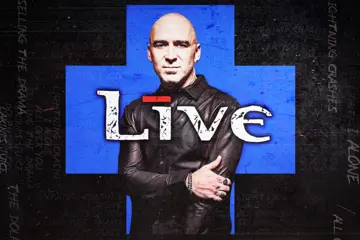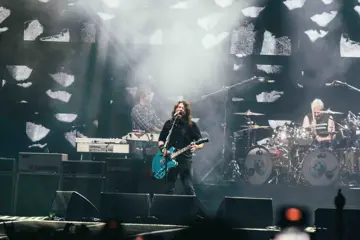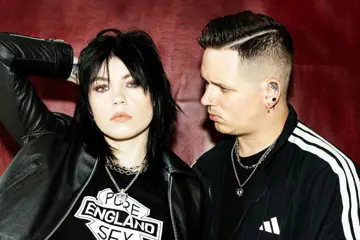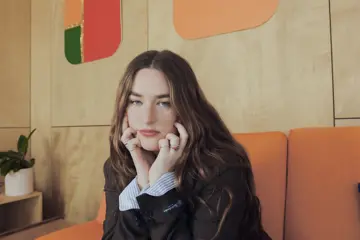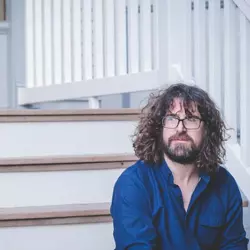 Lou Barlow
Lou BarlowLou Barlow is nothing if not a man of sonic extremes. From his earliest hardcore forays with Deep Wound in the early-'80s through his stints with Dinosaur Jr and Sebadoh over the next few decades he's made some of the most raucous music imaginable, but in this same time he also earned for himself a reputation for being the 'king of lo-fi' as he concocted some gorgeously quiet music under his own name as well as with various outfits Sebadoh, Sentridoh and Folk Implosion.
Even now as he talks to The Music about his new pared-back solo album Brace The Wave - his first album on his lonesome since 2009's Goodnight Unknown, and third overall - he's in a hotel in Akron, Ohio in the midst of a Dinosaur Jr summer US tour. He has no real hard answer as to why it was time for a far quieter piece of work right now - the album finds him switching between acoustic guitars, subtle electric guitar and even down-tuned ukulele - only that intuition told him that it seemed like a good idea.
"If you've got things to do and you're feeling inspired and you like what you hear, it's the greatest feeling in the world for me. I love it."
"It just felt like it was time, I hadn't put out an album for a while and I just thought it was time to do it. I live in Massachusetts again now so was in really close proximity to [producer] Justin Pizzoferrato who had worked on the Dinosaur Jr reunion records, and Justin had got a studio space for himself and people were telling me, 'You've got to go see it, it's great'. So I just emailed Justin and asked if he had any free time and said, 'Can I get six days out of you in the next month or two?' and he said, 'Yeah, sure'," he laughs. "I'd worked with Justin so much, and having that kind of an ease with someone that you work with on that level is magic, it makes everything so much easier and I get along with Justin really well. I would say that we're of like minds about a lot of things sonically, and he's smarter than I am and he can work the equipment and do all that stuff - he's just a really nice person so I knew that it would be okay. I did it for myself, I didn't ask anybody if they wanted a Lou Barlow album, I just did it. I paid it for myself and didn't worry about it, I just thought that I'd record as much as I could afford and just do that - six days was it, and I did it and now we have a new record."
Fortunately Barlow attests that the process creating Brace The Wave with Pizzoferrato was exactly as much fun as he'd envisaged.
"I knew it was going to be cool, so I didn't approach those days with any trepidation or ambivalence, it was, like, 'This is going to be great! I get to hang out with Justin and record some new songs'," he enthuses. "There was no fretting, I had a bunch of songs and at the very least I knew I could sit down in a chair and play a bunch of songs and then if I needed to I could throw them all away - I didn't new care, I knew it would be fun no matter what. I just did it because I thought that it was healthy - that it was a healthy thing to do right now - and then I really liked what we did.
Don't miss a beat with our FREE daily newsletter
"I had maybe two songs finished entirely [before we went into studio], two I had just finished at home, and then the rest I had really good ideas of what I wanted to do. And most of the lyrics. I went in prepared, and especially once I did the first session then the next session I was even more prepared and more ambitious about it. It was like that each successive day that I went in, it was awesome. I hadn't had a really good cathartic studio time in a long time, and it was cool."
Barlow feels that the cathartic nature of the Brace The Wave project stemmed from just being allowed a little 'me time'.
"It was just me working on my songs for 12 hours a day, or ten hours a day, so it was just the energy," he recalls. "When you record with a band and you're all working together no one's necessarily taking on the whole load - you're kind of passing things off to each other - but when it's just yourself it's a real bloodletting, it's awesome. If you've got things to do and you're feeling inspired and you like what you hear, it's the greatest feeling in the world for me. I love it."
Is there anything lyrically tying the songs on Brace The Wave together?
"I dunno," Barlow shrugs. "I think Brace The Wave itself - the title - just means that you're ready for change, so it's like 'here comes a change, survive it'. I do think all of those songs do have a little bit of that sentiment in them, just survival. That's generally where I write from anyway, so it's not that unusual or extraordinary a theme."
What about the whole 'king of lo-fi' tag - which stemmed mainly from his earliest bedroom forays - does Barlow enjoy the quiet realms as much as blasting eardrums in loud rock bands?
"Yeah, I love it," he smiles. "I love ambient noises, I love fuzziness and distortion and things like that. And I like something that sounds raw - I like rawness, I like a raw capture. That's something I've always liked. I love quiet music and I love loud music, I even love in-between music! It's good to create things that at least reflect my taste. I write all songs quietly to start with generally. I write them as quiet songs, then if I think I can sing them over the top of a band then I'll bring them to the band."
In Australia especially this assertion has long been public knowledge courtesy the Lou Barlow Plays Waterfront album, which (although released in 1996) is a recording of a 1995 instore at Sydney's Waterfront Records where he played (incredible) acoustic versions of predominantly Sebadoh songs, proving in the process that these brilliant indie rock numbers worked just as well stripped back to the bone.
"It was great, I felt really important that day! I was, like, 'What the fuck?'" he chuckles. "When I drove in it was crazy - it was one of the only experiences I've ever had like this - but I arrived in a car and somebody saw me in the car or the van and started running alongside me going, 'Lou! You're here!', it was so weird. Then I walk in and it was this collection of incredibly respectful boys and girls, kids who were a little bit younger than me, and I was, like, 'Holy shit, they're really here to listen to me! Oh my God!' It was cool, that was a really sweet experience for me. That was a really singular moment just in my experiences as a musician - it was really, really nice. Like almost totally uncorrupted by record label greed or expectation or any of the older, more complicated things that music could bring - it was a really pure expression and I really loved it. I really appreciated it."
1995 was also the year when Barlow suffered his largest commercial success, with the song Natural One from his side-project The Folk Implosion - which featured on the soundtrack for Larry Clark's controversial film Kids - reaching #29 on the Billboard Hot 100 and even breaking the Top 50 on the UK singles chart.
"Here's just an infinite variety of ways that you can combine the same old shit that everyone's heard and come up with new things, it's wonderful."
"That was awesome, it was amazing," Barlow remembers. "That was right around the time that [1994 Sebadoh album] Bakesale had just done really well, then I did the Kids soundtrack and that was kind of off the hook a little bit. I was doing all different kinds of music - again I had three bands; Folk Implosion, Sebadoh and myself solo. I was in heaven, it was great. People were paying for my studio time, and people were so receptive - it was my time and I loved it! I really enjoyed it, you could never say it was unappreciated at my end."
What about the actual craft of songwriting, has it changed for Barlow over the years in terms of either becoming easier or more difficult (as some attest) with experience?
"I don't know, I was thinking about that the other day," he ponders. "I think I had a kind of a hard time there at one stage. The beginning kind of stretched into that period [around 1995] that we were just talking about, and then in about '97 or '98 things got really complicated - there was a lot of expectation on the bands, and money became an issue, people were disgruntled and that kind of pure musical expression thing that was really driving me up until that point really got complicated. I got a lot more self-conscious and the songs started coming a lot slower, and that's when I thought it was really hard.
"Now I'm back to the point where it's, 'Who gives a shit? Sit down and write a goddamn song! Who cares? Just do it, it's fun!' That's true — writing a song is the funnest fucking thing you can do. There's just an infinite variety of ways that you can combine the same old shit that everyone's heard and come up with new things, it's wonderful. Music is such a great regenerative source, and the more you tap into that pure joy of just doing it the more fun it is. And that's something that really drove me for a long time, and then when that didn't happen anymore and things got a little more complicated then I had a few blows to my ego, where people told me I sucked and they were probably right! I used to be, like, 'Oh, shit!' but now I just care so much less. I just go, 'You know what? I probably do suck on some level, probably, I don't know'. It's best that I don't think about that part of it, and just focus on what I enjoy about it and make that be more important than my shortcomings. That's kind of happened again and I'm back into it."
It's posited that Barlow is a pretty great songwriter to be stressing too much about his shortcomings.
"But you can always get better," he smiles. "People can get better with age, that's the way it used to be."
What about the other side of the coin for musicians, hitting the road and sharing this music with his fans - does Barlow still enjoy that more interactive side of his profession?
"Oh totally, yeah," he says without hesitation. "With anything that I do there's always an adjustment period of playing new songs and that can be really painful for me, trying to learn stuff and trying to do good shows and trying to stay positive - you have to fail a lot when you try out new things, there has to be a lot of failure involved and that's tough. You can't be doing the most amazing thing right away - it takes a little bit of time sometimes to do that - and that's the hardest part for me, having the patience to play some shows that I feel that I could have done better and not getting too caught up in it. That's tough, but once I hit my groove I'm really, really happy."



